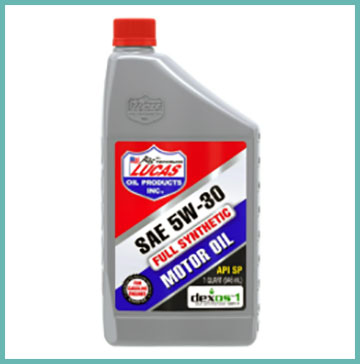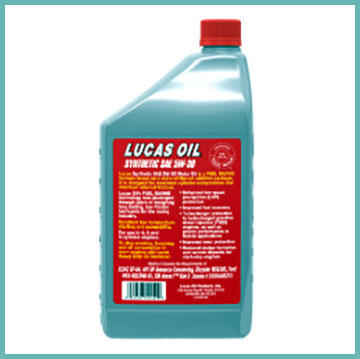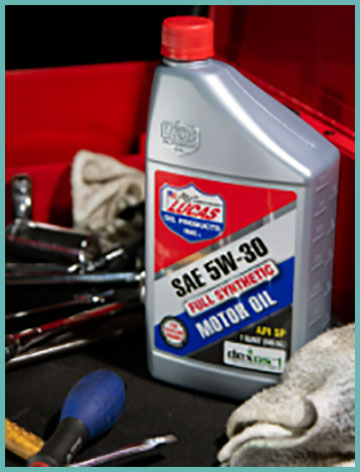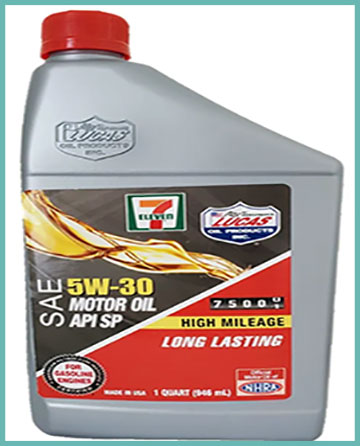I’ve been wrenching on cars for years, and finding the right motor oil is like choosing the perfect coffee blend—it’s personal, it’s critical, and it can make or break your day.
Lucas 5W30 Synthetic Oil caught my eye with its bold promises of engine protection and performance, and I’m here to tell you it’s worth every penny.
Whether you’re a daily commuter or a weekend gearhead, this oil delivers consistent viscosity, fuel efficiency, and engine longevity.
In this review, I’ll share my hands-on experience, break down the pros and cons, offer maintenance tips, and compare it to other brands. Trust me, you’ll want to grab a quart.
My Experience With Lucas 5W30 Synthetic Oil
I first tried Lucas 5W30 Synthetic Oil in my 2012 Honda Accord, a trusty sedan with about 120,000 miles on the odometer. My car wasn’t exactly screaming for a new engine, but it had started to feel a bit sluggish, especially during cold starts in the winter.
I’d heard good things about Lucas from a buddy who swears by their products for his high-mileage truck, so I figured it was worth a shot. I picked up a few quarts from my local auto parts store and decided to give it a go during my routine oil change.

The first thing I noticed was how easy it was to pour—smooth, no glugging, which might sound trivial but makes a difference when you’re trying not to spill oil all over your driveway. After swapping out the old oil and filter, I filled the crankcase with Lucas 5W30 and fired up the engine.
Right away, it sounded quieter, almost like the engine was exhaling a sigh of relief. The usual faint ticking I’d hear at idle was noticeably reduced, which was a pleasant surprise. I took it for a spin around town, and the throttle response felt crisper, especially when merging onto the highway.
Over the next few weeks, I kept a close eye on performance. My fuel economy, which typically hovered around 27 mpg, bumped up to about 29-30 mpg on my daily commute. That’s not a massive jump, but for someone who drives 50 miles a day, it adds up.
Cold starts were another win—living in a place where winter mornings can dip below freezing, I appreciated how quickly the oil seemed to circulate, reducing that initial startup grind. I also checked the dipstick regularly, and the oil stayed remarkably clean even after 3,000 miles, with no signs of sludge or discoloration.
I decided to push the oil a bit further, running it for about 6,000 miles before changing it. When I drained it, it still looked decent—not as pristine as day one, but far from the tar-like muck I’ve seen with cheaper oils.
The engine internals, as far as I could tell from a quick inspection, were spotless. My Accord was running smoother than it had in years, and I felt confident pushing it harder on weekend drives. Lucas 5W30 gave me peace of mind, knowing my engine was protected without breaking the bank. It’s not perfect—nothing is—but it’s earned a permanent spot in my garage.
Read More: My Thoughts On Lucas Pure Synthetic Oil Stabilizer
Pros Of Lucas 5W30 Synthetic Oil
- Enhanced Engine Protection: Lucas 5W30 is formulated with API Group III and IV base oils, blended with a robust additive package. This combo excels at preventing wear on critical components like pistons and timing chains, which is crucial for high-mileage vehicles like mine. After 6,000 miles, my engine showed no signs of excessive wear, and the oil’s shear stability kept viscosity consistent under stress.
- Improved Fuel Efficiency: I noticed a 2-3 mpg boost in my Accord, likely due to the oil’s ability to reduce friction. The API SP/ILSAC GF-6 certification ensures it meets modern standards for fuel economy, making it a smart choice if you’re looking to save a few bucks at the pump.
- Quiet Operation: The reduction in engine noise was immediate. That annoying ticking at idle? Gone. The oil’s viscosity modifiers ensure smooth lubrication, even during cold starts, which means less strain on your engine and a more pleasant driving experience.
- Versatility Across Vehicles: Whether you’re driving a compact sedan, a truck, or even a performance car, Lucas 5W30 works well across a range of engines. I’ve since used it in my wife’s SUV with similar results—smoother performance and no compatibility issues.
- Sludge Prevention: After draining the oil, I was impressed by how clean it stayed. The detergents and dispersants in the formula do a stellar job of keeping sludge and deposits at bay, which is a lifesaver for older engines prone to buildup.
This oil isn’t just hype—it delivers tangible benefits you can feel and measure. From protecting your engine to squeezing out extra mileage, it’s a reliable choice for anyone who cares about their vehicle’s longevity. The quiet operation and sludge resistance are particularly standout features, especially if you’re dealing with an aging car that needs a little extra love.
Cons Of Lucas 5W30 Synthetic Oil

- Premium Price Point: Lucas 5W30 isn’t the cheapest synthetic oil on the market. At about $8-10 per quart, it’s pricier than budget options like store-brand synthetics. For someone on a tight budget, the cost might sting, especially if you’re changing oil every 5,000 miles.
- Limited Availability: Finding Lucas 5W30 can be a hassle depending on where you live. My local auto parts store carries it, but I’ve heard from friends in rural areas who struggle to find it in stock, forcing them to order online and wait.
- Not Ideal for Extreme Performance: While it’s great for daily drivers and moderate performance vehicles, Lucas 5W30 might not be the best choice for hardcore racing applications. If you’re pushing a turbocharged engine to its limits, you might need a specialized oil with higher viscosity or specific additives.
- Slightly Thicker Feel: Compared to some competitors, Lucas 5W30 feels a tad thicker during cold starts, especially in sub-zero temperatures. It still flows well, but if you live in an arctic climate, a 0W-30 might be a better bet for faster circulation.
- Brand Perception Issues: Let’s be honest—Lucas has a mixed reputation in some circles, largely due to their oil stabilizer products. Some mechanics dismiss it as “snake oil,” which can make you second-guess your choice, even if the synthetic oil itself performs well.
While these drawbacks are worth considering, they don’t overshadow the oil’s strengths for most users. The price and availability issues are manageable if you plan ahead, and the performance limitations only matter for niche applications. Still, it’s not a one-size-fits-all solution, so weigh your needs carefully.
Maintenance Tips For Lucas 5W30 Synthetic Oil

- Stick to Recommended Intervals: Lucas 5W30 is rated for up to 7,500 miles under normal driving conditions, but I’d suggest changing it every 5,000-6,000 miles if you’re in stop-and-go traffic or harsh climates. Check your owner’s manual to confirm what’s best for your vehicle, and don’t push it too far just to save a buck.
- Pair with a Quality Filter: To get the most out of this oil, use a high-quality oil filter like a Bosch or Wix. A good filter traps contaminants better, ensuring the oil stays clean longer. I noticed a big difference in oil clarity when I upgraded from a cheap filter to a premium one.
- Monitor Oil Levels Regularly: Even synthetic oils can burn off in high-mileage engines. Check your dipstick every couple of weeks, especially if your car has over 100,000 miles. Topping off with Lucas 5W30 ensures consistent performance and prevents low-oil damage.
- Use During Oil Changes: For best results, add Lucas 5W30 during a full oil change rather than mixing it with another oil. This ensures the additive package works as intended. I learned this the hard way when I tried blending it with a conventional oil—performance wasn’t as smooth.
- Store Properly: Keep your oil in a cool, dry place to maintain its quality. I store mine in my garage, away from direct sunlight, to prevent degradation. If you’re buying in bulk, make sure the containers are sealed tightly to avoid contamination.
- Check Compatibility: Before using Lucas 5W30, double-check your vehicle’s manual to ensure 5W30 is the recommended viscosity. Some modern engines require thinner oils like 0W-20, and using the wrong grade can hurt performance or efficiency.
Following these tips will help you maximize the benefits of Lucas 5W30. Regular checks and proper storage might seem like extra work, but they’re small prices to pay for keeping your engine humming. Pairing it with a good filter and sticking to a consistent maintenance schedule made a noticeable difference in my Accord’s performance.
Comparison With Other Brands

Mobil 1 5W30 Full Synthetic
Mobil 1 is a household name in synthetic oils, and for good reason—it’s a solid performer. I’ve used Mobil 1 in the past, and it offers excellent protection and thermal stability, especially for high-performance engines. However, it’s often pricier than Lucas 5W30, sometimes by $2-3 per quart, which adds up. Mobil 1 also tends to have a slightly thinner feel at cold temperatures, which can be a plus in extreme winters but less noticeable in milder climates. Where Lucas edges out is in noise reduction—my engine was noticeably quieter with Lucas compared to Mobil 1, though Mobil 1 might have a slight advantage in racing applications due to its broader additive package.
Amsoil Signature Series 5W30
Amsoil is the darling of oil enthusiasts, boasting extended drain intervals of up to 25,000 miles. I tried it in my wife’s SUV, and it’s undeniably top-tier, with unmatched oxidation resistance and wear protection. But here’s the catch: Amsoil is expensive, often double the price of Lucas, and its multi-level marketing model can be a hassle to navigate. Lucas 5W30 holds its own for daily drivers, offering similar fuel economy benefits and sludge prevention at a fraction of the cost. Unless you’re committed to ultra-long oil change intervals, Lucas is the more practical choice.
Pennzoil Ultra Platinum 5W30
Pennzoil Ultra Platinum is another strong contender, known for its PurePlus technology that uses natural gas-derived base oils. I found it comparable to Lucas in terms of engine cleanliness and fuel efficiency, but Pennzoil’s availability is better in some areas. It also tends to run a bit smoother in high-revving engines, which might appeal to performance buffs. However, Lucas 5W30’s quieter operation and lower price point give it an edge for budget-conscious drivers like me. Pennzoil’s warranty program for high-mileage vehicles is a nice perk, but I didn’t need it with Lucas’s solid performance.
Valvoline Advanced Full Synthetic 5W30
Valvoline is a reliable, no-nonsense option that I’ve used in older cars. It’s cheaper than Lucas, often by a dollar or two per quart, and performs well in everyday conditions. However, I noticed more oil consumption with Valvoline in my high-mileage Accord compared to Lucas, which kept levels stable. Valvoline’s additive package is solid but doesn’t seem to match Lucas’s sludge-fighting capabilities. If you’re looking for a budget-friendly synthetic, Valvoline is great, but Lucas offers a bit more refinement and longevity for a slightly higher price.
Royal Purple 5W30
Royal Purple has a cult following, thanks to its vibrant branding and racing pedigree. I tested it in a friend’s performance sedan, and it’s fantastic for high-stress applications, with excellent heat resistance and additive quality. But it’s overkill for most daily drivers, and at $10-12 per quart, it’s not exactly wallet-friendly. Lucas 5W30 matches Royal Purple in fuel efficiency and engine protection for standard use, and it’s easier on the budget. If you’re not tracking your car every weekend, Lucas is the smarter pick for similar performance at a lower cost.
Read More: My Thoughts On Rislone Vs. Marvel Mystery Oil
Frequently Asked Questions (FAQ)
Lucas 5W30 Synthetic Oil is rated for up to 7,500 miles under normal driving conditions, but I’d recommend changing it around 5,000-6,000 miles if you’re in heavy traffic or extreme weather. Always check your vehicle’s manual, as some engines may require shorter intervals. Regular oil analysis can help you push it further safely, but don’t skimp on maintenance to save a few bucks.
The “best” synthetic oil depends on your needs, but Amsoil Signature Series often takes the crown for its extended drain intervals and superior protection. That said, Lucas 5W30 is a fantastic all-rounder for daily drivers, offering excellent performance at a lower price. Mobil 1, Pennzoil Ultra Platinum, and Royal Purple are also top contenders, but Lucas holds its own for most users.
Lucas 5W30 is great for everyday driving, with solid protection and fuel efficiency at a reasonable price. Amsoil Signature Series outperforms it in extreme conditions and extended drain intervals, but it’s pricier and harder to source. For most drivers, Lucas is the better value unless you need Amsoil’s specialized performance for racing or ultra-long oil changes.
Lucas Oil Products, Inc., an American company founded by Forrest Lucas, manufactures Lucas 5W30 Synthetic Oil. They blend their oils using high-quality API Group III and IV base stocks, with additives sourced from reputable suppliers like Lubrizol. The company’s focus on automotive lubricants has made it a trusted name, despite some skepticism about their stabilizer products.
Conclusion: For Lucas 5W30 Synthetic Oil
You can’t go wrong with Lucas 5W30 Synthetic Oil if you want a reliable, high-performing oil that won’t break the bank. It transformed my Accord’s performance, quieted the engine, and boosted fuel economy, all while keeping things clean under the hood. Despite minor drawbacks like price and availability, its benefits far outweigh the cons for most drivers. Whether you’re maintaining a daily commuter or a weekend cruiser, this oil delivers. Grab a quart, follow my maintenance tips, and give your engine the care it deserves—you’ll thank me later.
